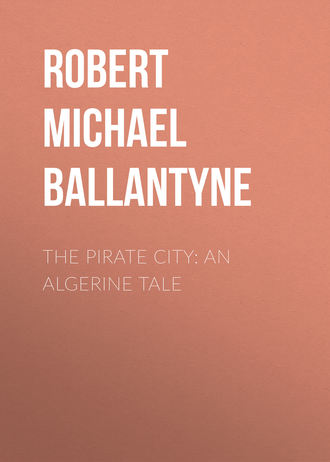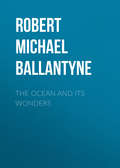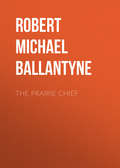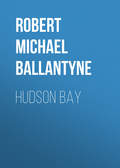
Robert Michael Ballantyne
The Pirate City: An Algerine Tale
Mariano felt abashed, yet at the same time rather nettled.
“Truly, then,” he said, with a glance at his blood-stained shirt, “it seems to me that I have at all events begun my lesson in the right school. However, I believe thou art right, Bacri, and I bear thee no ill-will for the rap thou didst bestow on my skull, which, luckily, is a thick one, else thy ponderous fist had split it from the cranium to the chin.”
“We had misjudged you, Bacri,” said Francisco, extending his hand, as the Jew rose to depart.
“We will lay your advice to heart; and we thank you, meanwhile, for coming to see us in this foul den, which I dislike less because of moisture and dirt—these being familiar to me—than because of the lively reptiles which hold their nightly revels in it.”
There was mingled humour and bitterness in Francisco’s tone, as he uttered this sentence, which he concluded with a heavy sigh. Immediately after, the rusty bolts of their prison-door grated harshly on their ears, and they listened sadly to the retreating footsteps of one whom they now esteemed their only friend, as they died away in the distance.
Chapter Seven.
Some New Characters walk, glide, and furiously gallop into the Tale, and otherwise introduce themselves to Notice
In the interior court of a beautiful Moorish villa not far from the city, sat Mrs Langley, wife of Colonel Langley, British consul at the “Court” of Algiers.
The lady of whom we write was unusually romantic, for her romance consisted of a deep undercurrent of powerful but quiet enthusiasm, with a pretty strong surface-flow of common-sense. Her husband was a man of noble mind and commanding presence—a magnificent representative John Bull, with the polish of a courtier and the principles of a Christian; one who had been wisely chosen to fill a very disagreeable post, full of responsibility and danger.
On a stool at the feet of Mrs Langley sat a sunny second edition of herself, about eight years of age, named Agnes. In the cradle which Agnes had formerly occupied reposed a remarkably plump and dimpled representative of the Colonel. When respectfully addressed he was called Jim, but he was more familiarly known as Baby.
A small negress from beyond the Zahara, and blacker than any coal, rocked Jim violently. For this—not the rocking, but the violence—she had been unavailingly rebuked by Mrs Langley, until that lady’s heart had nearly lost all hope.
“There—you have done it again, Zubby,” said Mrs Langley, referring to a push that well-nigh rolled Master Jim, (as a sea-captain once said), out at the starboard side of the cradle.
Zubby confessed her guilt, by looking abashed—and what a solemn look an abashed one is in a negress with very large eyes!—as well as by rocking more gently.
Agnes vented a sudden little laugh at the expression of Zubby’s face; and, the door opening at that moment, Colonel Langley entered the court, and sat down beside his wife under the giant leaves of a small banana-tree, whose life was drawn from a boxful of earth about three feet square.
“My dear,” said the Colonel, “I have two rather amusing things to lay before you this evening. One is a gift from the Dey, the other is a letter. Which will you have first?”
“The gift, of course,” replied the lady.
“Let her come in, Ali,” called the Colonel to his interpreter, who stood in the passage outside.
Rais Ali, a Moor clad in the usual Turkish garb, but with a red fez or skull-cap on his head instead of a turban, threw open the door leading out of the court, and ushered in poor Paulina Ruffini with her child.
“Is this the Dey’s gift?” asked the astonished lady, rising hurriedly.
“It is; at least she is lent to us, and we are bound to accept her.—Address her in French, my dear; she does not understand English. In fact, you’d better take her to your own room and have a talk.”
Mrs Langley addressed to the poor captive a few reassuring words, and led her away, leaving the Colonel to amuse himself with Agnes.
“What has she been sent to us for?” asked Agnes.
“To be a serv— a companion to you and baby, my pet.”
“That was kind of the Dey, wasn’t it?” said the child.
“Well—ye–es; oh yes, doubtless, it was very kind of him,” replied the Colonel.
We fear that the Colonel did not fully appreciate the kindness that resulted in the gift either of Paulina Ruffini as his servant, or of Sidi Hassan as his attendant, for he saw clearly that the former was unaccustomed to menial work, and he knew that Sidi Hassan was a turbulent member of the community. However, being a man of prompt action, and knowing that it was of the utmost importance that he should stand well in the good graces of the Dey, he resolved to receive Paulina into his establishment as governess of the nursery and companion to his wife, and to leave Sidi Hassan very much to the freedom of his own will, so long as that will did not interfere with the interests of the consulate.
On the return of his wife he listened to her pathetic account of Paulina’s sad history, and then produced the letter to which he had referred on first entering.
“This letter necessitates my riding into town immediately. It is a curious document in its way, therefore lend me your ear.”
Opening it he began to read. We give it verbatim et literatim:—
“To the brittish Cownsul algeers.
“7 teenth Jully, 18—
“Sur i’m an irishman an a sailer an recked on the cost of boogia wid six of me messmaits hoo are wel an arty tho too was drowndid on landin an wan wos spiflikated be the moors which are born divls an no mistaik. I rite to say that weer starvin but the Kaid as they cals the guvner Here says heel take a ransum for us of 150 spanish dolars the Kaid has past his word in yoor name to the moors for that sum or theyd hav spiflikate us too. I hope yer onor has as much to spair in yer pokit, an will luke alive wid it, for if yoo don’t its all up wid me mesmaits inkloodin yoor onors obedent humbil servint to comand ted flagan.”
“Well, I hope, with poor Flaggan,” said Mrs Langley laughingly, “that you have as much to spare in your ‘pokit,’ for if not, it is plain that the poor fellows will be led into captivity.”
“I would readily advance a larger sum for so good an end,” replied the consul, folding the letter. “I shall at once ride into town to make arrangements, and as it is so late, will pass the night in our town house. I shall send our new attendant, Sidi Hassan, on this mission, and leave you for the night under the guardianship of Rais Ali.”
The consul left immediately, and next morning Sidi Hassan set out for Bugia with the necessary ransom.
In regard to this we need say nothing more than that he accomplished his purpose, paid the ransom, and received the seven British seamen, accompanied by whom he commenced the return journey, he and his men riding, and driving the sailors on foot before them as though they had been criminals. On the way, however, they were attacked, not far from Algiers, by a body of predatory Arabs from the Jurjura mountains.
These bold villains, at the very first onset, killed more than half of the Turkish escort, and put the rest to flight. Six of the sailors they captured and carried off, but Ted Flaggan, who was an exceedingly active as well as powerful man, proved himself more than a match for them all. During the mêlée he managed to throw himself in the way of one of the best-mounted among the Arabs, who instantly charged him, but Ted sprang aside and let him pass, ducking low to avoid a cut from his curved sword.
Before he could turn, the Irishman ran close to his side, seized him by the burnous, at the same time grasping his bridle, and pulled him out of the saddle with such sudden violence that he fell headlong to the ground, where he lay quite stunned by the fall. Flaggan instantly sprang into the saddle, as if he had been an accomplished cavalier, though in reality he knew no more about horses than an Esquimaux. However, a man who was accustomed to hold on to a top-sail-yard in a gale was not to be easily shaken off by an Arab charger. He clung to the high saddle-bow with one hand, and with the other grasped his clasp-knife, which he opened with his teeth. Therewith he probed the flanks of his fiery steed to such an extent that he not only distanced all his Arab pursuers, but overtook and passed his own escort one by one, until he reached Sidi Hassan himself. He then attempted to pull up, but the clasp-knife had fired the charger’s blood in an unusual degree. With a wicked snort and fling that lifted Flaggan high out of the saddle, it rushed madly on, left the pirate captain far behind, and at length dashed through the Bab-Azoun gate of Algiers, despite the frantic efforts of the guard to check or turn it. Right onward it sped through the street Bab-Azoun, scattering Turks, Moors, Jews, negroes, and all the rest of them like chaff; passed the Dey’s palace, straight along the street Bab el-Oued; out at the water-gate, with similar contempt of the guards; down into the hollow caused by the brook beyond; up the slope on the other side, half-way towards the summit, on the opposite side of Frais Vallon, and was not finally pulled up until it had almost run down the British consul, who chanced to be riding leisurely homeward at the time.
“You seem to have had a pretty sharp run, my man,” said the consul, laughing, as the Irishman thankfully jumped off, and grasped the bridle of the now thoroughly winded horse.
“Faix an’ I have, yer honour; an’ if I haven’t run down an’ kilt half the population o’ that town, wotever’s its name, no thanks to this self-opiniated beast,” replied Flaggan, giving the bridle a savage pull.
“You’re an Irishman, I perceive,” said the consul, smiling.
“Well, now, yer right, sur; though how ye came to persaive is more nor I can understand.”
“Where have you come from? and how in such a plight?” demanded the consul in some surprise, observing that a troop of janissaries came galloping up the winding road, near the top of which they stood.
“Sorrow wan o’ me knows where we touched at last,” replied the seaman in some perplexity; “the names goes out o’ me head like wather out of a sieve. All I’m rightly sure of is that I set sail four days ago from a port they calls Boogee, or so’thin’ like it, in company with a man called Seedy Hassan; an’ sure he’d ha bin seedy enough be now if his horse hadn’t bin a good ’un, for we wos attacked, and half his party killed and took, forby my six messmates; but—”
“Your name is Ted Flaggan?” inquired the consul hastily.
“It is,” said the seaman, in great surprise; “sure yer honour must be—”
The sentence was cut short by the arrival of the janissaries, who pulled up with looks of considerable astonishment on finding the mad fugitive engaged in quiet conversation with the British consul.
“Gentlemen,” said Colonel Langley, with much urbanity of tone and manner, “I suppose you wish to make a prisoner of this man?”
The soldiers admitted that such was their desire and intention.
“Then you will oblige me,” continued the Colonel, “by allowing me to be his jailer in the meantime. He is a British subject, of whom I can give a good account at the fitting time and place. Sidi Hassan, under whose charge he has been by my orders, will doubtless soon arrive in town, and further enlighten you on this subject.”
Without waiting for a reply the Colonel bowed, and wheeling his horse round rode quietly away, followed by the Irishman, who regarded his new jailer with a very puzzled look, while a touch of humour further tended to wrinkle his remarkably expressive countenance.
Chapter Eight.
Ted Flaggan and Rais Ali proceed on a Mission, and see Impressive Sights
Two days after the events narrated in the last chapter, Mrs Langley, being seated on her favourite couch in the court under the small banana-tree, sent Zubby into the garden to command the attendance of Ted Flaggan. That worthy was gifted with a rare capacity for taking the initiative in all things, when permitted to do so, and had instituted himself in the consul’s mansion as assistant gardener, assistant cook and hostler, assistant footman and nurseryman, as well as general advice-giver and factotum, much to the amusement of all concerned, for he knew little of anything, but was extremely good-humoured, helpful, and apart from advice-giving—modest.
“Flaggan,” said Mrs Langley, when the stout seaman appeared, hat in hand, “I want you to accompany our interpreter, Rais Ali, into town, to bring out a message from a gentleman named Sidi Omar. Ali himself has other duties to attend to, and cannot return till evening, so take particular note of the way, lest you should miss it in returning.”
“I will, ma’am,” replied Ted, with a forecastle bow, “Does Mister Ally onderstand English?”
“Oh yes,” returned Mrs Langley, with a laugh. “I forgot that he was absent when you arrived. You will find that he understands all you say to him, though I’m not quite sure that you will understand all he says to you. Like some of the other Moors here, he has been in the British navy, and has acquired a knowledge of English. You’ll find him a pleasant companion, I doubt not. Be so good as to tell him that I wish to see him before he leaves.”
Obedient to the summons, Rais Ali quickly appeared. The interpreter was a stout, tall, dignified man of about thirty-five, with a great deal of self-assertion, and a dash of humour expressed in his countenance.
“Ali,” said Mrs Langley, “you are aware that Sidi Omar is to be married to-morrow. I have been invited to the wedding, but have stupidly forgotten the hour at which I was asked to see the bride dressed. Will you go to Sidi Omar, or some of his people, and find this out? Take the sailor, Mr Flaggan, with you, and send him back with the information as soon as possible.”
“Yis, mum,” replied the interpreter; “an’ please, mum, I was want too, tree days’ leave of absins.”
“No doubt Colonel Langley will readily grant your request. Have you some particular business to transact, or do you merely desire a holiday?”
“Bof,” replied the Moor, with a mysterious smile. “I’se got finished the partikler bizziness of bein’ spliced yesterdays, an’ I wants littil holiday.”
“Indeed,” said Mrs Langley in surprise, “you have been very quiet about it.”
“Ho yis, wery quiet.”
“Where is your bride, Ali? I should like so much to see her.”
“Her’s at ’ome, safe,” said Rais Ali, touching a formidable key which was stuck in his silken girdle.
“What! have you locked her up?”
“Yis—’bleeged to do so for keep her safe.”
“Not alone, I hope?” said Mrs Langley.
“No, not ’lone. Her’s got a bootiflul cat, an’ I means buy her a little nigger boy soon.”
Having arranged that Mrs Langley was to visit his bride on her way to Sidi Omar’s wedding the following day, Rais Ali set out on his mission, accompanied by Mr Flaggan.
The Irishman soon discovered that the Moor was a conceited coxcomb and a barefaced boaster, and ere long began to suspect that he was an arrant coward. He was, however, good-humoured and chatty, and Ted, being in these respects like-minded, rather took a fancy to him, and slily encouraged his weakness.
“Ye must have seed a power o’ sarvice in the navy, now,” he said, with an air of interest; “how came you to git into it?”
“Ha! that wos cos o’ me bein’ sitch a strong, good-lookin’ feller,” replied Ali, with an air of self-satisfaction.
“Just so,” said Flaggan; “but it’s not common to hear of Moors bein’ taken aboard our men o’ war, d’ee see. It’s that as puzzles me.”
“Oh, that’s easy to ’splain,” returned Ali. “The fac’ is, I’d bin for sev’l year aboord a Maltese trader ’tween Meddrainean an’ Liverp’l, and got so like a English tar you coodn’t tell the one fro’ the oder. Spok English, too, like natif.”
“Ha!” exclaimed Ted, nodding his head gravely—“well?”
“Well, one night w’en we was all sleeperin’ in port, in a ’ouse on shore, the press-gang comes round an’ nabs the whole of us. We fight like lions. I knock seven men down, one before the tother, ’cause of bein’ very strong, an’ had learn to spar a littil. You know how to spar?”
“Well,” returned Ted, looking with a smile at his huge hands, “I can’t go for to say as I know much about the science of it, d’ee see; but I can use my fists after a fashion.”
“Good,” continued the Moor. “Well, then, we fights till all our eyes is black, an’ all our noses is red, an’ some of our teeths is out, but the sailirs wos too many for us. We wos ’bleeged to gif in, for wot kin courage do agin numbers? so we wos took aboord a friggit and ’zamined.”
“An’ what?” asked the seaman.
“’Zamined. Overhauled,” replied the Moor.
“Oh! examined, I see. Well?”
“Well, I feels sure of git hoff, bein’ a Algerine Moor, so w’en my turn comes, I says to the hofficer wot ’zamined us, says I, ‘I’s not a Breetish man!’
“‘Wot are you, then?’ says the hofficer.
“‘I’s a Moor,’ says I.
“‘Moor’s the pity,’ says he.”
Ted gave a short laugh at this.
“Now, that’s strange,” observed Ali, glancing at his companion in some surprise; “that’s ’zactly wot they all did, w’en the hofficer says that! I’ve thought oftin ’bout it since, but never could see wot they laugh at.”
“Oh, it’s just a way we’ve got,” returned Flaggan, resuming his gravity; “the English have a knack o’ larfin’, off and on, w’en they shouldn’t ought to.—Git along with your yarn.”
“Well, that wos the finish. I became a Breetish tar, an’ fouted in all the battils of the navy. I ’spected to get promotion an’ prize-money, but nivir git none, ’cause of circumstances as wos never ’splained to me. Well, one night we come in our friggit to anchor in bay of Algiers. I gits leave go ashore wi’ tothers, runs right away to our Dey, who gits awrful waxy, sends for Breetish cap’n, ’splain that I’s the son of a Turk by a Algerine moder an’ wery nigh or’er the cap’n’s head to be cutted off.”
“You don’t say so?”
“Yis, it’s troo. Wery near declare war with England acause of that,” said Ali, with an air of importance. “But the Breetish consul he interfere, goes down on hims knees, an’ beg the Dey for to parding hims nation.”
“He must ha’ bin a cowardly feller, that consul!”
“No,” said the interpreter sternly, “him’s not coward. Him was my master, Kurnil Langley, an’ only do the right ting: humbil hisself to our Dey w’en hims contry do wrong.—Now, here we is comin’ to Bab-el-Oued, that means the Water-gate in yoor lingo, w’ere the peepils hold palaver.”
This in truth appeared to be the case, for many of the chief men of the city were seated under and near the gate, as the two drew near, smoking their pipes and gossiping in the orthodox Eastern style.
The big Irishman attracted a good deal of notice as he passed through the gates; but Turks are grave and polite by nature: no one interrupted him or made audible comments upon his somewhat wild and unusual appearance.
Passing onwards, they entered the town and traversed the main street towards the Bab-Azoun gate, which Ali explained to his companion was the Gate of Tears, and the place of public execution.
Here they came suddenly on the body of a man, the feet and limbs of which were dreadfully mangled, showing that the miserable wretch had perished under the bastinado.
At the time we write of, and indeed at all times during Turkish rule, human life was held very cheap. For the slightest offences, or sometimes at the mere caprice of those in power, men were taken up and bastinadoed in the open streets until they died from sheer agony, and their relations did not dare to remove the bodies for burial until their tyrants had left the scene. Cruelty became almost the second nature of the people. Theft was checked by the amputation of the first joint of the fore-finger of the right hand for the first offence. For the second, the whole hand was sacrificed, and for the third, the head itself was forfeited. Sometimes, in cases of capital punishment, decapitation was performed by degrees! and other refinements too horrible to mention were constantly practised.
While the interpreter was explaining to his companion as much of this as he deemed it right for him to know, several of the sorrowing relations of the dead man came forward and carried the body away. Little notice was taken of the incident, which, from beginning to end, scarcely interrupted the general flow of business.
At the Bab-Azoun gate, which occupied a position not many yards distant from the spot on which now stands the principal theatre of Algiers, Ali left Ted Flaggan for a few minutes, begging him to wait until he had transacted a piece of business in the market held just outside the gate.
“Tell me before ye go, Ally, what may be the use of them three big hooks close to the gate,” said Flaggan, pointing upwards.
“Them’s for throwin’ down teeves an’ murderers on to.—You stay here; me not be wery long come back.”
Rais Ali hurried away, leaving the sailor to observe and moralise on all that passed around him. And there was a good deal to induce thought in one who had been accustomed to comparatively humane laws and merciful dispensations in his native land, for, besides the scene which he had just witnessed, and the huge hooks whose uses had just been explained to him, he now noticed that several conspicuous places near him were garnished with the heads of malefactors who had been recently executed. He observed, also, that the innumerable donkeys which were being constantly driven past him, overladen with market produce, were covered with open sores, and that these sores appeared to be selected for special flagellation when the brutal drivers wished to urge the wretched creatures on.
He stood thus for some time watching with interest the throng of Turks, Jews, Moors, negroes, and others that continually streamed to and fro, some on foot, some on horseback, and others, especially the men with marketable commodities, on mules and donkeys. It was not difficult for him to distinguish between the races, for Rais Ali had already told him that none but Turks were permitted to wear the turban, not even the sons of Turks by Algerine mothers, and that the Jews were by law commanded to dress in sombre black.
Suddenly he observed a body of men advancing towards the gate, carrying something in their arms, and followed by an orderly crowd at a respectful distance. With the curiosity of an idler he approached, and found that they bore a man, who was firmly bound hand and foot. The man was a Moor, and the anxious look of his pale face showed that he was about to suffer punishment of some kind.
The seaman mingled with the crowd and looked on.
Laying the man on the ground with his face downwards, the officers of justice sent away two of their number, who speedily returned with a blacksmith’s anvil and forehammer. On this they placed one of their victim’s ankles, and Flaggan now saw, with a sickening heart, that they were about to break it with the ponderous hammer. One blow sufficed to crush the bones in pieces, and drew from the man an appalling shriek of agony. Pushing his leg farther on the anvil, the executioner broke it again at the shin, while the other officials held the yelling victim down. A third blow was then delivered on the knee, but the shriek that followed was suddenly cut short in consequence of the man having fainted. Still the callous executioner went on with his horrible task, and, breaking the leg once more at the thigh, proceeded to go through the same process with the other leg, and also with the arms. When twelve blows had thus been delivered, the writhing of the wretched victim proved that he was still alive, though his labouring chest was now incapable of giving vent to his agony in shrieks.
We would not describe such a scene as this were it not certainly true; and we relate it, reader, not for the purpose of harrowing your feelings, but for the sake of showing what diabolical deeds we men are capable of, unless guarded therefrom by the loving and tender spirit of Jesus Christ. We say “spirit” advisedly, for we are well aware that false professors of that blessed name have, many a time, committed deeds even more horrible than that which we have just described.
Unable to bear the sight longer, the sailor turned and hurried away from the spot.
Fortunately he met Rais Ali just outside the crowd.
“Come, lad, come,” he cried, seizing that boastful man by the arm, in such a grasp that Rais turned pale with alarm. “I can’t stop here. Let’s git away. Sure it’s divls they must be, an’ not men!”
Blindly dragging the interpreter along by main force through several streets, Flaggan stopped suddenly at last to recover breath and to wipe the perspiration from his brow.
“Don’t ask me wot I’ve seen,” he said, to Ali’s inquiries, “I can’t a-bear to think on it. God help me! I wish I could wipe it out of me brain intirely. Come along, let’s finish our business, an’ git out o’ this cursed place.”
Proceeding rapidly and in silence towards the street at the base of the triangular town, which followed the line of ramparts that faced the sea, they discovered the great man of whom they were in search, Sidi Omar, walking up and down with the cadi, or chief judge, to whose daughter he was to be united on the following day.
“It won’t do to ’trupt ’em jus’ yit. Hold on a littil,” said Rais Ali to his companion.
Ted Flaggan had no objection to “hold on,” for the sight of the ocean with its fresh breezes cooled his brow, and tended to turn his mind away from the horrible thoughts that filled it.
While they are waiting, let you and me, reader, listen to the conclusion of the converse held between the bridegroom and father-in-law.
The cadi was a stern old Turk, with a long grey beard. The son-in-law elect was, as we have elsewhere said, an ill-favoured elderly man with only one eye. He did not look quite so happy as one would have expected in a bridegroom so near his wedding-day, but that was to be accounted for, to some extent, by the fact that he already possessed four wives, and was naturally somewhat used to weddings.
“No, no,” said he, in a cautious tone, to the judge; “it won’t do to be hasty about it, Achmet is too popular at present.”
“What has that to do with the question?” asked the cadi, in a tone of contempt. “If our party be strong enough we have only to strike; and I tell you that I believe it to be quite strong enough.”
“I know it,” returned Omar impatiently, “but I also know that my enemy, Sidi Hassan, is more than usually on the alert just now; I think it well to delay for a time. Besides,” he added, smiling, “you surely would not have me begin a revolution on the very eve of my marriage!”
“I would have you lose as little time as possible,” replied the cadi. “But see, if I mistake not, these two men are eyeing us rather narrowly.”
Seeing that they were observed, Rais Ali advanced, and, with a low salaam, delivered his message to Sidi Omar, who gave him the necessary reply, and dismissed him.
Resuming their conference, the two magnates turned to saunter along the street, when Omar observed a dark object like a dog, coiled up in an angle of the parapet. Poking it with his cane, he caused it to uncoil and display the vacant, features of a half-witted negro boy. The poor creature fell on his knees in alarm on seeing the well-known face of Sidi Omar, but sprang to his feet with alacrity, and ran off at full speed on being sternly told to “be gone.”
Meanwhile Rais Ali led his friend safely through the Bab-el-Oued gate, and, turning his face in the right direction said—
“Now, you git ’ome, fast. Keep ’er steady—a point morer to the westward—so, yoo can’t go wrong.”
Instead of obeying orders, Ted Flaggan turned, and, with an amused smile, watched the retreating figure of the interpreter. Then, after sauntering on some distance in a reverie, he stopped and gazed long and earnestly at the pirate city, whose white-washed domes and minarets gleamed in the sunshine like marble, contrasting beautifully with the bright green of the Sahel hills behind, and the intense blue of the sky and sea.
“A whited sepulchre!” muttered the seaman, with a frown, as he turned away and pushed forward at a rapid pace towards the residence of the British consul.







